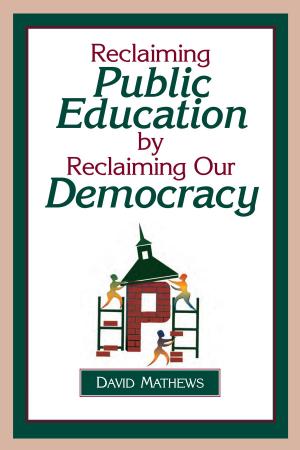Voice and Judgment
The Practice of Public Politics
Nonfiction, Social & Cultural Studies, Political Science, Government, Civics| Author: | Robert J. Kingston | ISBN: | 9781945577291 |
| Publisher: | Kettering Foundation | Publication: | January 1, 2012 |
| Imprint: | Kettering Foundation | Language: | English |
| Author: | Robert J. Kingston |
| ISBN: | 9781945577291 |
| Publisher: | Kettering Foundation |
| Publication: | January 1, 2012 |
| Imprint: | Kettering Foundation |
| Language: | English |
In Voice and Judgment: The Practice of Public Politics, Robert Kingston, senior associate of the Kettering Foundation, provides a comprehensive analysis of the continuing public deliberations carried out, nationwide, over the past 30-some years, under the auspices of the National Issues Forums and other organizations.
The task of publicly “talking through” a national or community problem is not always easy. Nor has an answer (or an agreement) always been found—or universally shared! But what regularly does emerge, when people deliberate, is a kind of shared understanding. At best, it is the sense of a shared public will. More important yet, such public deliberations suggest something of what it may take to make democracy work as it should. And, after several decades of deliberation, some of us have come to suspect that at the core of our democracy may be less the right to vote than the opportunity to deliberate.
This study responds to critical and controversial domestic and multinational issues that have challenged—and sometimes still do challenge—citizens’ relations to each other and their degrees of trust in their elective government. Many such issues remain continuing problems for the American public and its leadership; but the public discussion of each reveals, in compelling ways, not merely the need for, but also the extraordinary promise of public deliberation as a means of moving tensely conflicting issues toward the kind of shared understanding from which viable public policies may grow—or to an increasingly shared understanding even of issues that, at points, have seemed to bear irreconcilable expectations.
The public voice is seldom the voice that the establishment—the political, corporate, and press establishments—is anxious to hear. And unless we are prepared to present and explain the dilemmas that the public acknowledges and is preparing to cope with—rather than primarily the opinions that people in their uncertainty express—we might as well leave the public voice at home.
The continuing practice of public deliberation itself reveals, in this book, the slow-paced movement that translates the idea of change into the conceptualizing of public action.
In Voice and Judgment: The Practice of Public Politics, Robert Kingston, senior associate of the Kettering Foundation, provides a comprehensive analysis of the continuing public deliberations carried out, nationwide, over the past 30-some years, under the auspices of the National Issues Forums and other organizations.
The task of publicly “talking through” a national or community problem is not always easy. Nor has an answer (or an agreement) always been found—or universally shared! But what regularly does emerge, when people deliberate, is a kind of shared understanding. At best, it is the sense of a shared public will. More important yet, such public deliberations suggest something of what it may take to make democracy work as it should. And, after several decades of deliberation, some of us have come to suspect that at the core of our democracy may be less the right to vote than the opportunity to deliberate.
This study responds to critical and controversial domestic and multinational issues that have challenged—and sometimes still do challenge—citizens’ relations to each other and their degrees of trust in their elective government. Many such issues remain continuing problems for the American public and its leadership; but the public discussion of each reveals, in compelling ways, not merely the need for, but also the extraordinary promise of public deliberation as a means of moving tensely conflicting issues toward the kind of shared understanding from which viable public policies may grow—or to an increasingly shared understanding even of issues that, at points, have seemed to bear irreconcilable expectations.
The public voice is seldom the voice that the establishment—the political, corporate, and press establishments—is anxious to hear. And unless we are prepared to present and explain the dilemmas that the public acknowledges and is preparing to cope with—rather than primarily the opinions that people in their uncertainty express—we might as well leave the public voice at home.
The continuing practice of public deliberation itself reveals, in this book, the slow-paced movement that translates the idea of change into the conceptualizing of public action.















